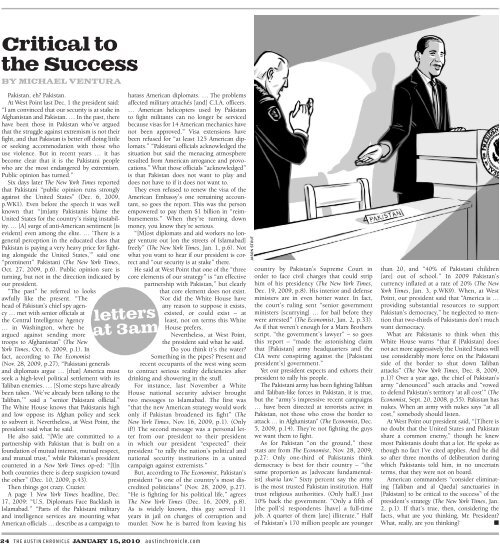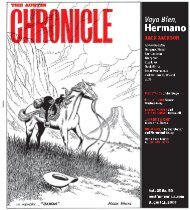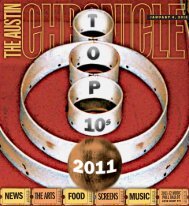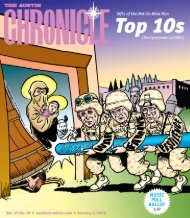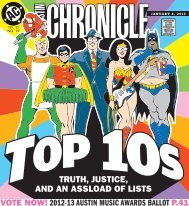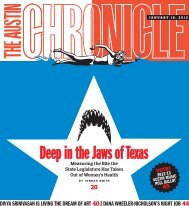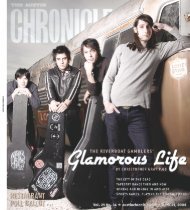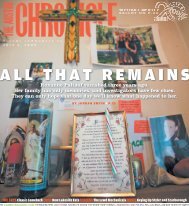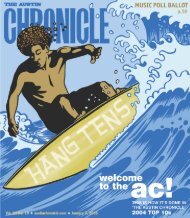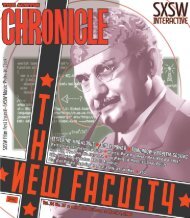Prodigious Songcraft Blooms in Sarah Jarosz - The Austin Chronicle
Prodigious Songcraft Blooms in Sarah Jarosz - The Austin Chronicle
Prodigious Songcraft Blooms in Sarah Jarosz - The Austin Chronicle
- No tags were found...
You also want an ePaper? Increase the reach of your titles
YUMPU automatically turns print PDFs into web optimized ePapers that Google loves.
Critical tothe SuccessBY MICHAEL VENTURAPakistan, eh? Pakistan.At West Po<strong>in</strong>t last Dec. 1 the president said:“I am conv<strong>in</strong>ced that our security is at stake <strong>in</strong>Afghanistan and Pakistan. … In the past, therehave been those <strong>in</strong> Pakistan who’ve arguedthat the struggle aga<strong>in</strong>st extremism is not theirfight, and that Pakistan is better off do<strong>in</strong>g littleor seek<strong>in</strong>g accommodation with those whouse violence. But <strong>in</strong> recent years … it hasbecome clear that it is the Pakistani peoplewho are the most endangered by extremism.Public op<strong>in</strong>ion has turned.”Six days later <strong>The</strong> New York Times reportedthat Pakistani “public op<strong>in</strong>ion runs stronglyaga<strong>in</strong>st the United States” (Dec. 6, 2009,p.WK1). Even before the speech it was wellknown that “[m]any Pakistanis blame theUnited States for the country’s ris<strong>in</strong>g <strong>in</strong>stability.… [A] surge of anti-American sentiment [isevident] even among the elite. … ‘<strong>The</strong>re is ageneral perception <strong>in</strong> the educated class thatPakistan is pay<strong>in</strong>g a very heavy price for fight<strong>in</strong>galongside the United States,’” said one“prom<strong>in</strong>ent” Pakistani (<strong>The</strong> New York Times,Oct. 27, 2009, p.6). Public op<strong>in</strong>ion sure isturn<strong>in</strong>g, but not <strong>in</strong> the direction <strong>in</strong>dicated byour president.“<strong>The</strong> past” he referred to looksawfully like the present. “<strong>The</strong>head of Pakistan’s chief spy agency… met with senior officials atthe Central Intelligence Agency… <strong>in</strong> Wash<strong>in</strong>gton, where heargued aga<strong>in</strong>st send<strong>in</strong>g moretroops to Afghanistan” (<strong>The</strong> NewYork Times, Oct. 6, 2009, p.1). Infact, accord<strong>in</strong>g to <strong>The</strong> Economist(Nov. 28, 2009, p.27), “Pakistani generalsand diplomats argue … [that] America mustseek a high-level political settlement with itsTaliban enemies. … [S]ome steps have alreadybeen taken. ‘We’ve already been talk<strong>in</strong>g to theTaliban,’” said a “senior Pakistani official.”<strong>The</strong> White House knows that Pakistanis highand low oppose its Afghan policy and seekto subvert it. Nevertheless, at West Po<strong>in</strong>t, thepresident said what he said.He also said, “[W]e are committed to apartnership with Pakistan that is built on afoundation of mutual <strong>in</strong>terest, mutual respect,and mutual trust,” while Pakistan’s presidentcountered <strong>in</strong> a New York Times op-ed: “[I]nboth countries there is deep suspicion towardthe other” (Dec. 10, 2009, p.43).<strong>The</strong>n th<strong>in</strong>gs got crazy. Crazier.A page 1 New York Times headl<strong>in</strong>e, Dec.17, 2009: “U.S. Diplomats Face Backlash <strong>in</strong>Islamabad.” “Parts of the Pakistani militaryand <strong>in</strong>telligence services are mount<strong>in</strong>g whatAmerican officials … describe as a campaign tolettersat 3amharass American diplomats. … <strong>The</strong> problemsaffected military attachés [and] C.I.A. officers.… American helicopters used by Pakistanto fight militants can no longer be servicedbecause visas for 14 American mechanics havenot been approved.” Visa extensions havebeen refused for “at least 125 American diplomats.”“Pakistani officials acknowledged thesituation but said the menac<strong>in</strong>g atmosphereresulted from American arrogance and provocations.”What those officials “acknowledged”is that Pakistan does not want to play anddoes not have to if it does not want to.<strong>The</strong>y even refused to renew the visa of theAmerican Embassy’s one rema<strong>in</strong><strong>in</strong>g accountant,so goes the report. This was the personempowered to pay them $1 billion <strong>in</strong> “reimbursements.”When they’re turn<strong>in</strong>g downmoney, you know they’re serious.“[M]ost diplomats and aid workers no longerventure out [on the streets of Islamabad]freely” (<strong>The</strong> New York Times, Jan. 1, p.6). Notwhat you want to hear if our president is correctand “our security is at stake” there.He said at West Po<strong>in</strong>t that one of the “threecore elements of our strategy” is “an effectivepartnership with Pakistan,” but clearlythat core element does not exist.Nor did the White House haveany reason to suppose it exists,existed, or could exist – atleast, not on terms this WhiteHouse prefers.Nevertheless, at West Po<strong>in</strong>t,the president said what he said.Do you th<strong>in</strong>k it’s the water?Someth<strong>in</strong>g <strong>in</strong> the pipes? Present andrecent occupants of the west w<strong>in</strong>g seemto contract serious reality deficiencies afterdr<strong>in</strong>k<strong>in</strong>g and shower<strong>in</strong>g <strong>in</strong> the stuff.For <strong>in</strong>stance, last November a WhiteHouse national security adviser broughttwo messages to Islamabad. <strong>The</strong> first was“that the new American strategy would workonly if Pakistan broadened its fight” (<strong>The</strong>New York Times, Nov. 16, 2009, p.1). (Onlyif!) <strong>The</strong> second message was a personal letterfrom our president to their president<strong>in</strong> which our president “expected” theirpresident “to rally the nation’s political andnational security <strong>in</strong>stitutions <strong>in</strong> a unitedcampaign aga<strong>in</strong>st extremists.”But, accord<strong>in</strong>g to <strong>The</strong> Economist, Pakistan’spresident “is one of the country’s most discreditedpoliticians” (Nov. 28, 2009, p.27).“He is fight<strong>in</strong>g for his political life,” agrees<strong>The</strong> New York Times (Dec. 16, 2009, p.8).As is widely known, this guy served 11years <strong>in</strong> jail on charges of corruption andmurder. Now he is barred from leav<strong>in</strong>g hisJASON STOUTcountry by Pakistan’s Supreme Court <strong>in</strong>order to face civil charges that could striphim of his presidency (<strong>The</strong> New York Times,Dec. 19, 2009, p.8). His <strong>in</strong>terior and defensem<strong>in</strong>isters are <strong>in</strong> even hotter water. In fact,the court’s rul<strong>in</strong>g sent “senior governmentm<strong>in</strong>isters [scurry<strong>in</strong>g] … for bail before theywere arrested” (<strong>The</strong> Economist, Jan. 2, p.33).As if that weren’t enough for a Marx Brothersscript, “the government’s lawyer” – so goesthis report – “made the astonish<strong>in</strong>g claimthat [Pakistan] army headquarters and theCIA were conspir<strong>in</strong>g aga<strong>in</strong>st the [Pakistanipresident’s] government.”Yet our president expects and exhorts theirpresident to rally his people.<strong>The</strong> Pakistani army has been fight<strong>in</strong>g Talibanand Taliban-like forces <strong>in</strong> Pakistan, it is true,but the “army’s impressive recent campaigns… have been directed at terrorists active <strong>in</strong>Pakistan, not those who cross the border toattack … <strong>in</strong> Afghanistan” (<strong>The</strong> Economist, Dec.5, 2009, p.14). <strong>The</strong>y’re not fight<strong>in</strong>g the guyswe want them to fight.As for Pakistan “on the ground,” thesestats are from <strong>The</strong> Economist, Nov. 28, 2009,p.27: Only one-third of Pakistanis th<strong>in</strong>kdemocracy is best for their country – “thesame proportion as [advocate fundamentalist]sharia law.” Sixty percent say the armyis the most trusted Pakistan <strong>in</strong>stitution. Halftrust religious authorities. (Only half.) Just10% back the government. “Only a fifth of[the poll’s] respondents [have] a full-timejob. A quarter of them [are] illiterate.” Halfof Pakistan’s 170 million people are youngerthan 20, and “40% of Pakistani children[are] out of school.” In 2009 Pakistan’scurrency <strong>in</strong>flated at a rate of 20% (<strong>The</strong> NewYork Times, Jan. 3, p.WK9). When, at WestPo<strong>in</strong>t, our president said that “America is …provid<strong>in</strong>g substantial resources to supportPakistan’s democracy,” he neglected to mentionthat two-thirds of Pakistanis don’t muchwant democracy.What are Pakistanis to th<strong>in</strong>k when thisWhite House warns “that if [Pakistan] doesnot act more aggressively the United States willuse considerably more force on the Pakistaniside of the border to shut down Talibanattacks” (<strong>The</strong> New York Times, Dec. 8, 2009,p.1)? Over a year ago, the chief of Pakistan’sarmy “denounced” such attacks and “vowedto defend Pakistan’s territory ‘at all cost’” (<strong>The</strong>Economist, Sept. 20, 2008, p.55). Pakistan hasnukes. When an army with nukes says “at allcost,” somebody should listen.At West Po<strong>in</strong>t our president said, “[T]here isno doubt that the United States and Pakistanshare a common enemy,” though he knewmost Pakistanis doubt that a lot. He spoke asthough no fact I’ve cited applies. And he didso after three months of deliberation dur<strong>in</strong>gwhich Pakistanis told him, <strong>in</strong> no uncerta<strong>in</strong>terms, that they were not on board.American commanders “consider elim<strong>in</strong>at<strong>in</strong>g[Taliban and al Qaeda] sanctuaries <strong>in</strong>[Pakistan] to be critical to the success” of thepresident’s strategy (<strong>The</strong> New York Times, Jan.2, p.1). If that’s true, then, consider<strong>in</strong>g thefacts, what are you th<strong>in</strong>k<strong>in</strong>g, Mr. President?What, really, are you th<strong>in</strong>k<strong>in</strong>g?24 T H E A U S T I N C H R O N I C L E JANUARY 15, 2010 a u s t i n c h r o n i c l e . c o m


